- Home
- War in the Middle East
- Akrotiri and Dhekelia: The Last British Remnants in Cyprus
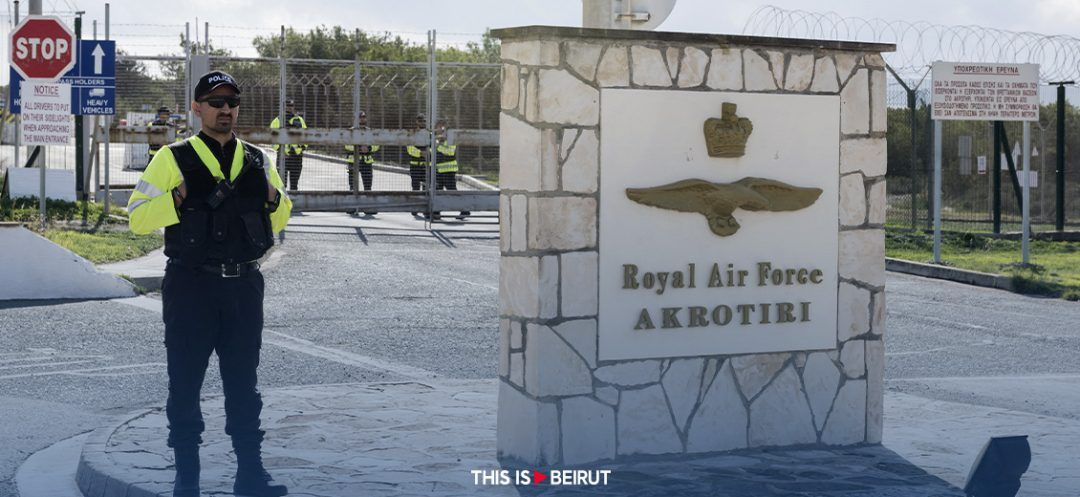
©(Iakovos Hatzistavrou / AFP)
Cyprus is home to two British-operated military bases, Akrotiri and Dhekelia. These bases have been brought to the fore at a time when Hezbollah Secretary General Hassan Nasrallah is directly threatening Nicosia.
A key point from Hezbollah's Secretary General's latest speech was the threats directed at the Republic of Cyprus. He warned, "We will consider ourselves at war with Cyprus if the island opens its airports and military bases to Israel for targeting Lebanon."
While the involvement of the easternmost member of the European Union might seem amusing, it is highly probable that the leader of the pro-Iranian group is primarily targeting two British installations on the island.
[readmore url="https://thisisbeirut.com.lb/lebanon/265521"]
Known as the Sovereign Base Areas of Akrotiri and Dhekelia, these installations are significant remnants of the British Empire in the Eastern Mediterranean. Strategically located, these bases play crucial roles in the military and political objectives for the United Kingdom and its allies.
Akrotiri and Dhekelia cover approximately 254 square kilometers, which is about 3% of the total area of the island. These well-known British sovereign base areas were established in 1960, concurrently with Cyprus gaining its independence.
Under the Zurich and London agreements, which led to the establishment of the Cypriot state, the British retained these territories for geopolitical reasons. Indeed, these bases provide a strategic position in the Eastern Mediterranean, crucial for controlling maritime and aerial routes.
Furthermore, they are located near the Middle East conflict zones, thus providing an ideal platform for British operations in the region. The Akrotiri base, situated in the southern part of the island, is especially significant as it features a long runway and infrastructure able to accommodate the largest cargo planes. Meanwhile, Dhekelia is mainly a land base, serving as a logistics and intelligence hub.
Akrotiri and Dhekelia fulfill three primary roles for the British government. The first, with a strong military focus, is predominantly represented by Akrotiri. It serves as a base for the Royal Air Force (RAF), the British Air Force branch, conducting reconnaissance, surveillance, and strike missions. The United Kingdom and its allies, especially the United States, use this base for operations in the Middle East.
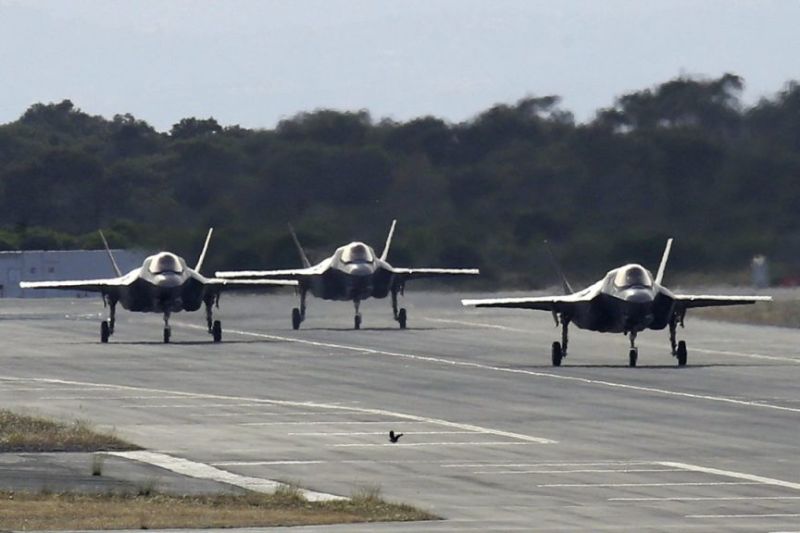 British F-35B fighter jets at the Royal Air Forces base at Akrotiri, near the coastal town of Limassol on the Mediterranean island of Cyprus, on May 21, 2019. (Petros Karadjias / POOL / AFP)
British F-35B fighter jets at the Royal Air Forces base at Akrotiri, near the coastal town of Limassol on the Mediterranean island of Cyprus, on May 21, 2019. (Petros Karadjias / POOL / AFP)
The second function is represented by the Ayios Nikolaos station, situated in the Dhekelia area. It functions as an electromagnetic intelligence gathering station (telecommunications, radar signals, etc.), integrated into the ECHELON network—a partnership among British, American, Canadian, Australian, and New Zealand intelligence services. This station provides surveillance across a broad region encompassing North Africa, the Middle East, and Southern Europe.
Finally, the third function is humanitarian. Due to their proximity to various conflict zones, these bases serve as essential transit points for international aid missions. Akrotiri, in particular, played a pivotal role during the Yazidi genocide by the jihadist group Islamic State in 2014, with RAF aircraft conducting humanitarian aid drops over Mount Sinjar. More recently, the airbase was used to deliver aid to the besieged population of Gaza, amidst Israeli military actions.
These British bases are a persistent source of tension between the UK and Cyprus. Nicosia regards these territories as remnants of the colonial period.
In 2005, a resolution adopted by the Cypriot Parliament recognized only partial sovereignty of London over these territories, asserting it was confined to military matters rather than administrative and financial ones. In turn, the British government asserted its refusal to recognize Cypriot claims.
However, bilateral agreements govern their use and ensure economic and security benefits for Cyprus. The bases provide employment opportunities for many Cypriots while also injecting substantial funds into the local economy.
Cyprus and Israel have deepened their military cooperation. Since 2014, the two countries have regularly conducted joint military exercises, with the most recent taking place in May 2023.
While Cyprus has consistently allowed Israel to use its airspace for exercises, this does not extend to periods of conflict. This position was recently underscored by Cypriot President Nikos Christodoulides in response to Hassan Nasrallah's statements, asserting that "the Republic of Cyprus does not in any way participate in hostilities."
[readmore url="https://thisisbeirut.com.lb/world/265473"]
In practice, Nicosia's involvement in the Israel-Hamas conflict has mainly focused on humanitarian efforts. Cyprus has notably facilitated the establishment of a maritime humanitarian aid corridor to Gaza since March.
A stance that does not extend to the British bases established on the island. London has notably used Akrotiri to launch strikes against the Houthis.
However, according to information published by the British media outlet Declassified UK in November 2023, this British base has primarily been used to transit weapons to Israel from the UK and the US.
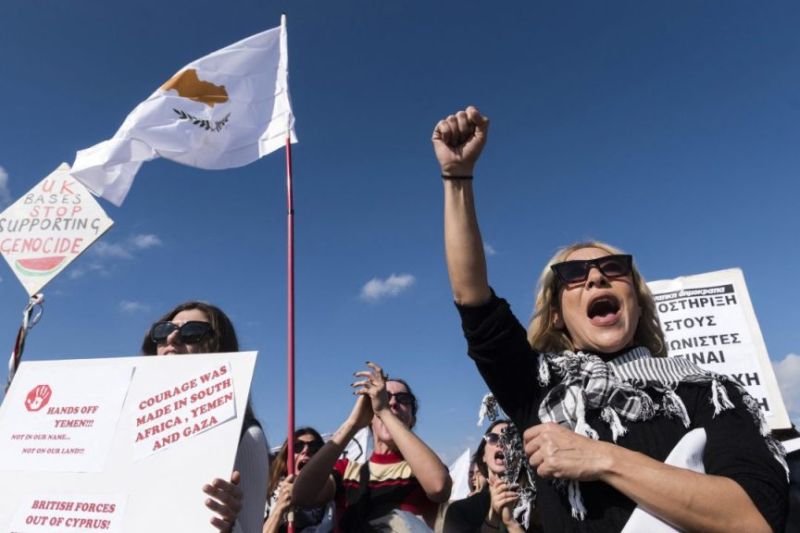 Peace demonstrators shout slogans outside the gates of the Royal Air Force base at Akrotiri, a British overseas territory near the Cypriot coastal town of Limassol, as they rally against its alleged use to supply Israel's war in Gaza, a claim denied by Britain, on January 14, 2024. (Iakovos Hatzistavrou / AFP)
Peace demonstrators shout slogans outside the gates of the Royal Air Force base at Akrotiri, a British overseas territory near the Cypriot coastal town of Limassol, as they rally against its alleged use to supply Israel's war in Gaza, a claim denied by Britain, on January 14, 2024. (Iakovos Hatzistavrou / AFP)
While London claims to regularly inform Nicosia about activities conducted at the base, the British military stated in a parliamentary hearing that it has no "formal obligation" to do so.
With Akrotiri falling under the sovereignty of the United Kingdom, the Cypriot government lacks any legal means to enforce estrictions on its British counterpart regarding ongoing operations. This scenario highlights the ongoing ineffectiveness of Hassan Nasrallah's threats.
A key point from Hezbollah's Secretary General's latest speech was the threats directed at the Republic of Cyprus. He warned, "We will consider ourselves at war with Cyprus if the island opens its airports and military bases to Israel for targeting Lebanon."
While the involvement of the easternmost member of the European Union might seem amusing, it is highly probable that the leader of the pro-Iranian group is primarily targeting two British installations on the island.
[readmore url="https://thisisbeirut.com.lb/lebanon/265521"]
Known as the Sovereign Base Areas of Akrotiri and Dhekelia, these installations are significant remnants of the British Empire in the Eastern Mediterranean. Strategically located, these bases play crucial roles in the military and political objectives for the United Kingdom and its allies.
Sovereign base areas
Akrotiri and Dhekelia cover approximately 254 square kilometers, which is about 3% of the total area of the island. These well-known British sovereign base areas were established in 1960, concurrently with Cyprus gaining its independence.
Under the Zurich and London agreements, which led to the establishment of the Cypriot state, the British retained these territories for geopolitical reasons. Indeed, these bases provide a strategic position in the Eastern Mediterranean, crucial for controlling maritime and aerial routes.
Furthermore, they are located near the Middle East conflict zones, thus providing an ideal platform for British operations in the region. The Akrotiri base, situated in the southern part of the island, is especially significant as it features a long runway and infrastructure able to accommodate the largest cargo planes. Meanwhile, Dhekelia is mainly a land base, serving as a logistics and intelligence hub.
Airbase and monitoring station
Akrotiri and Dhekelia fulfill three primary roles for the British government. The first, with a strong military focus, is predominantly represented by Akrotiri. It serves as a base for the Royal Air Force (RAF), the British Air Force branch, conducting reconnaissance, surveillance, and strike missions. The United Kingdom and its allies, especially the United States, use this base for operations in the Middle East.
 British F-35B fighter jets at the Royal Air Forces base at Akrotiri, near the coastal town of Limassol on the Mediterranean island of Cyprus, on May 21, 2019. (Petros Karadjias / POOL / AFP)
British F-35B fighter jets at the Royal Air Forces base at Akrotiri, near the coastal town of Limassol on the Mediterranean island of Cyprus, on May 21, 2019. (Petros Karadjias / POOL / AFP)The second function is represented by the Ayios Nikolaos station, situated in the Dhekelia area. It functions as an electromagnetic intelligence gathering station (telecommunications, radar signals, etc.), integrated into the ECHELON network—a partnership among British, American, Canadian, Australian, and New Zealand intelligence services. This station provides surveillance across a broad region encompassing North Africa, the Middle East, and Southern Europe.
Finally, the third function is humanitarian. Due to their proximity to various conflict zones, these bases serve as essential transit points for international aid missions. Akrotiri, in particular, played a pivotal role during the Yazidi genocide by the jihadist group Islamic State in 2014, with RAF aircraft conducting humanitarian aid drops over Mount Sinjar. More recently, the airbase was used to deliver aid to the besieged population of Gaza, amidst Israeli military actions.
Relations with Nicosia
These British bases are a persistent source of tension between the UK and Cyprus. Nicosia regards these territories as remnants of the colonial period.
In 2005, a resolution adopted by the Cypriot Parliament recognized only partial sovereignty of London over these territories, asserting it was confined to military matters rather than administrative and financial ones. In turn, the British government asserted its refusal to recognize Cypriot claims.
However, bilateral agreements govern their use and ensure economic and security benefits for Cyprus. The bases provide employment opportunities for many Cypriots while also injecting substantial funds into the local economy.
Cyprus, Akrotiri, and War
Cyprus and Israel have deepened their military cooperation. Since 2014, the two countries have regularly conducted joint military exercises, with the most recent taking place in May 2023.
While Cyprus has consistently allowed Israel to use its airspace for exercises, this does not extend to periods of conflict. This position was recently underscored by Cypriot President Nikos Christodoulides in response to Hassan Nasrallah's statements, asserting that "the Republic of Cyprus does not in any way participate in hostilities."
[readmore url="https://thisisbeirut.com.lb/world/265473"]
In practice, Nicosia's involvement in the Israel-Hamas conflict has mainly focused on humanitarian efforts. Cyprus has notably facilitated the establishment of a maritime humanitarian aid corridor to Gaza since March.
A stance that does not extend to the British bases established on the island. London has notably used Akrotiri to launch strikes against the Houthis.
However, according to information published by the British media outlet Declassified UK in November 2023, this British base has primarily been used to transit weapons to Israel from the UK and the US.
 Peace demonstrators shout slogans outside the gates of the Royal Air Force base at Akrotiri, a British overseas territory near the Cypriot coastal town of Limassol, as they rally against its alleged use to supply Israel's war in Gaza, a claim denied by Britain, on January 14, 2024. (Iakovos Hatzistavrou / AFP)
Peace demonstrators shout slogans outside the gates of the Royal Air Force base at Akrotiri, a British overseas territory near the Cypriot coastal town of Limassol, as they rally against its alleged use to supply Israel's war in Gaza, a claim denied by Britain, on January 14, 2024. (Iakovos Hatzistavrou / AFP)While London claims to regularly inform Nicosia about activities conducted at the base, the British military stated in a parliamentary hearing that it has no "formal obligation" to do so.
With Akrotiri falling under the sovereignty of the United Kingdom, the Cypriot government lacks any legal means to enforce estrictions on its British counterpart regarding ongoing operations. This scenario highlights the ongoing ineffectiveness of Hassan Nasrallah's threats.
Read more


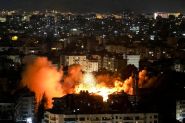
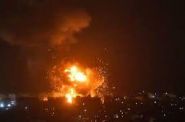
Comments